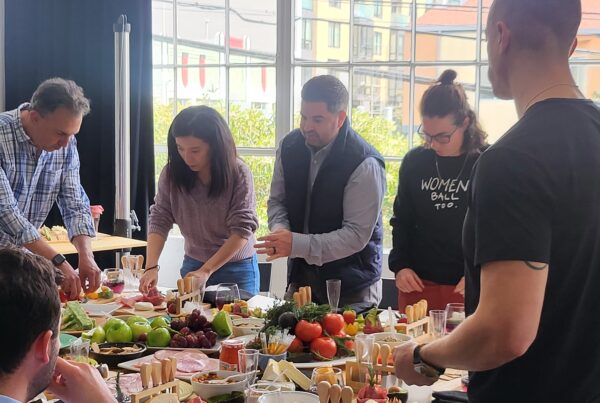No matter how you look at it, if any company wants to thrive, they need to have a team that works like a well-oiled machine.
Humans are wired for socialization — to be productive and move forward, we need to work together. The paradox is that human nature often makes it difficult as a unit.
We argue, have different opinions and viewpoints, have different values, cultural backgrounds, and work ethics – throw all of that into a room, and it is unlikely that the group will just get on with it and make things happen.
If you have ever watched reality shows like Survivor, you can see the conundrum in action. While participants entertained us as they completed challenges and lived off the land, the show’s true purpose was just one big social experiment.
A group that had never met before was forced to work together to survive, with no upfront knowledge of each other’s strengths and weaknesses, value systems, or backgrounds – and chaos ensued. But, as time passed and they figured each other out, alliances formed, bonding occurred, and certain groups thrived while others fell apart.
It would be interesting to tweak the angle and see how it would play out if the team embarked on a week of team building to figure each other out. It’s not exactly a new concept.
In the 1920s, corporations were introduced to the psychology behind teamwork and how team bonding boosted productivity, facilitated a sense of group identity, and fostered support and unity.
When industrial psychology boomed in the 90s, team-building strategies became the norm in the workplace, evolving as people’s needs and ideas changed with the times.
Post-COVID Corporates and Team Dynamics

The natural evolution of corporate life was derailed during the COVID pandemic and sent on a new trajectory. It was a challenging time for business, but more importantly, it was a difficult time for humanity, and many of us thought long and hard about our priorities.
As we redefined our norm and adapted to remote working, we were also juggling the fear of illness, worrying about our loved ones, and facing uncertainty about the future. And many people were no longer prepared to sell their souls to the rat race and be nothing more than worker bees for the rest of their lives.
Corporations had to think long and hard about how they could adapt their approach to their workforce to attract and retain top talent. Far more emphasis was placed on the value of mental health, employee wellness, and job satisfaction. ‘Working for the man’ and increasing the bottom line was meeting its match, and those in leadership positions had to ‘adapt or die.’
People also took stock of their quality of life and the importance of how their employers responded in crisis, which resulted in millions of resignations. Yet, despite this, there are still more than 10 million jobs available as companies struggle to fill the vacancies.
Fortunately, many companies met this with enthusiasm, and the old ‘top-down’ management model was adapted to become more people-centric and collaborative and took into account that people who feel valued and contribute to the bigger picture are far more likely to be motivated and productive.
And this was where traditional team bonding activities were turned on their heads. The old days of conferences and corporate retreats were put on the back burner, and businesses had to adapt their thinking to find creative ways to nurture team bonding in the virtual realm.
And as the world slowly returns to normal, many companies have realized that traditional team building and corporate retreats are not all they are cracked up to be.
Why Many Companies No Longer Embrace the Corporate Retreat

If you speak to a ‘traditionalist’ in a management position about corporate retreats, they will spew off a list of reasons.
For example, they will wax lyrical about how it is an opportunity for staff to get to know each other, have a chance to solidify as a unit, reflect on and settle conflicts, and so on and so on.
But, on the other hand, if you ask many of said traditionalist’s employees how they feel about a corporate retreat, many of them roll their eyes and gag, whispering, “This is just the worst!”
Because – let’s be honest – no one wants forced fun.
That is not to say that team bonding is not necessary. It is essential. It’s the approach that needs to change. Old school methods have been done to death, and people are over-trust falls, navigating blindfolded co-workers to find a prize, and zip-lining across a lagoon, legs flailing, in front of people, they wouldn’t spend time with the outside of work.
The new approach to corporate dynamics and team bonding has resulted in a wave of new, genuinely fun events and activities that will truly facilitate growth and development within a team. And many of them are adapted to the remote working culture that so many companies have embraced.
Remote team bonding expands the experience to include team members from around the world, and staff can enjoy their experience without leaving the comfort of their homes.
Employees want to have a good time and then return to their families.
Finding team bonding activities that really let employees let their hair down and don’t place them in awkward cringe-worthy situations is guaranteed to facilitate bonding and allow the team to identify each other’s skills and attributes.
When the activities are conducted properly, this is all happening subtly, and participants aren’t even aware of what they are learning.
Rockoly has some incredible remote team bonding activities available, such as cooking workshops and wine tasting, that encourage all sorts of team development without draining all the enthusiasm out of everyone. And your company doesn’t have to blow the annual budget to do it.
The Pitfalls of Corporate Retreats
They are expensive

And not just a bit steep – jaw-droppingly expensive. Many companies still choosing to go this route have pulled out all the stops to ‘make it count,’ and the reality is that the money could go to far better use.
Good team bonding can still be a priority, and the money that would have been spent on a retreat could go towards upskilling staff, investing in better facilities that affect employees’ everyday lives and offering rewards and incentives.
While some companies focus on the ‘nice-to-haves,’ staff really appreciate the ‘need-to-haves.’ Studies show that decent healthcare packages, flexibility, opportunities for growth, wellness benefits, and paid time off are far more valued than a weekend in Cancun.
I did some research into the cost of a corporate retreat. Obviously, each company has different needs, which vary according to the staff size and destination. Therefore, I used the following scenario.
- A New Jersey-based company plans a team bonding retreat. However, they decide to keep it within the US and choose Las Vegas as the destination.
- They travel by plane, and the tickets cost the average fare across all airlines.
- It’s not a very big company, so there will be 40 attendees.
- The retreat will run for three days.
- The company chooses a three-star hotel with basic conferencing venues to keep costs down.
- The team needs to pair up and share a room with a colleague.
- Meals are included.
- It takes a team of five people three working days to plan the presentations and activities. Their time is worth $50 per hour each.
- They have no external guest speakers but have two formal activities planned.
Based on these facts, the retreat will cost the company roughly $50,000. Considering that the median annual income in the US is $52,344, it puts it into perspective. And this is a modest estimate.
Some companies spare no experience and can spend in the region of $8000 per person. When you apply that to businesses with even as few as 20 employees, it’s enough to make your eyes water.
Then there are the hidden costs. For example, many employees resent that they will still have to spend a lot of their own money if beverages and other incidentals are for their own account.
And what about the family left at home? Have they had to pay for childcare assistance? Or a house sitter to care for their pets?
If your company has withheld bonuses and raises due to budget restraints, there will also be some bitterness from employees who see you happy to blow a massive amount on a three-day weekend when they are struggling to pay their rent.
They are inefficient

If your entire staff – or at least all but the bare minimum disappear for four days- it can’t be doing your business any favors as far as your clients are concerned. And if your retreat is in a more exotic location, there will be even more downtime if you consider travel time as well.
For example, if you are running an IT company and a client hits a massive security snag, I am sure they won’t accept that no one is available to assist because they are all sipping cocktails in Bali.
Then there is the fact that when people are at an exotic location, offering exciting nightlife, a party vibe, and gorgeous beaches, the last thing they will feel enthusiastic about is sitting in a conference room and hearing how they can improve the company culture.
Even the most well-planned, carefully executed retreat won’t miraculously transform your team into the Justice League. Taking a few days once a year to focus on team building is just not enough. It must be like a dripping tap, happening consistently throughout the year.
Then there is also the challenge of managing risk. In a group of thirty people, you are guaranteed to have at least a few that overdo it, misbehave, engage in drunken escapades, and have not-so-discreet trysts.
Not only can this damage the company culture and respect between colleagues, but it can also result in actual injury. And that, in turn, could lead to a legal nightmare.
They are not inclusive

In today’s world, we are far more aware of diversity and consider the needs of everyone. Corporate retreats can inadvertently exclude people, which can build up more resentment.
Those forced to go may resent those whose ‘excuse’ was valid enough to let them stay, and those who can’t go due to other factors may resent that the team is off galivanting without them.
Chances are, at least a few people will have to remain behind to man the office. Some employees have family responsibilities that they can’t delegate for the length of the retreat.
And others may live with a medical condition that makes it difficult to pack up and go to some far-flung location without access to their physicians or medical care.
What if a staff member is heavily pregnant or has a partner close to giving birth? They have no choice but to remain behind.
There is also the question of religious and cultural differences. For example, some religions have very strictly observed rituals when it comes to their dietary requirements. While there are places that cater to these, finding one that will cater equally to various needs is a challenge.
Why Rockoly Team Bonding Events Are the Way to Go

When you consider the pitfalls of corporate retreats, it is refreshing to know that there are options available that will engage your staff, allow for proper team bonding, and be genuine fun, and your staff won’t resent you for it in the end. Rockoly is ahead of the game, offering exciting online workshops for your team bonding experience.
Good food, wine, and merriment are society’s glue. Almost all celebrations, festivals, and get-togethers include food and drink, and history books are filled with stories of people coming together and sharing a meal.
Rockoly has harnessed the bonding power that food and drink provide and have developed a series of workshops that your remote staff can enjoy in the comfort of their own home, as well as in-person workshops for companies that still value some face-to-face time, but don’t want to burden their staff, by making them attend a compulsory retreat.
For those who have embraced the flexibility of the hybrid working model, Rockoly has an add-on that will cater to both your remote staff and those who are physically present.
These services are perfect for team bonding and are designed to bring out the best in everyone, leaving no one behind.
Because it is so much more cost-effective, it can become a regular part of your team’s routine so that they have something to look forward to, and the bonds get nurtured on an ongoing basis.
The long-term benefits of ‘small and steady’ far outweigh the big annual money bin. Here’s why:
They’re far less expensive

So much time and resources are spent on planning a retreat. Those involved with planning need to brainstorm an agenda, scout locations, and develop a program to make it meaningful.
With Rockoly, all the planning and preparation are taken off your hands, so no additional, unnecessary time is spent on the logistics.
Rockoly will handle everything, including ensuring that the necessary ingredients are delivered to each team member’s door.
There is no travel cost involved as your staff participate from home and no time is lost due to travel either.
In fact, with some menu options, you can cover the total cost of an employee for about the same as it would cost to send them and a friend to an Imax movie with a popcorn and soda combo each.
They’re Efficient
Every minute of every workshop is used. The activities are high-energy, fast-paced, and goal-driven. There are no awkward silences, small talk, or dead time. And because it is fun, quick, and affordable, it can be revisited regularly, varying the activities and menus as you go.
Rockoly’s workshops will ensure that your team comes together and has a great time while bonding, having fun, and creating something new. A team that can let their hair down together and enjoys each other’s company will be more motivated and energized to work together in their work environment.
Whether you select an online cooking workshop, a virtual Happy Hour, or a wine-tasting workshop, you are guaranteed to be met with enthusiasm, and your staff will have the energy and motivation to engage and have fun.
They’re Inclusive

In a world of hybrid teams, there must be hybrid team-building. Using modern tech and ingredient deliveries, companies can now include remote employees in their in-person cooking events. No one in your team will be left behind.
A Rockoly event planner will set everything up for your team, from projectors to microphones to 1-on-1 stations. Integration between your remote workers and your in-person crew should be as seamless as possible.
The menus cater to vegetarians and vegans too, and there are so many menu options available that it is easy to work towards a theme.
Perhaps you want to take them on a virtual Italian getaway, explore Asian cuisine or celebrate holiday dishes from around the world. Menus are customizable to suit your needs.
Rockoly’s wine-tasting and mixology workshops emphasize the experience and immersion in the culture, not just the drink itself.
So even those who prefer to abstain can still have plenty of fun, learn a thing or two and enjoy the team bonding experience.
Expert sommeliers will educate your team on the art of winemaking – an art that goes back to Phoenician times. Their passion and knowledge will bring out the oenophile in everyone.
If you are looking for something a little feistier, join highly trained mixologists as they share their skills in the art of mixing the perfect cocktail.
You will not only produce the perfect libation, but you will also rack up a few facts that will serve you well in the next trivia quiz.
For example, did you know that gin gets its name from the Dutch word ‘genever,’ which was their name for juniper berries, the main ingredient in gin?
Gin was originally created and distributed to treat gout and other ailments. British soldiers consumed gin during the Thirty Year’s War, and it gave them the ‘Dutch Courage’ that we speak of today. Grapes were not grown in the region, so it was adapted by fermenting mashed grains.
‘Whisky’ is Gaelic (the Celtic dialect spoken in Scotland) for ‘uisge beatha,’ meaning ‘water of life.’ The art of distillation was brought to Scotland and Ireland over 1000 years ago.
Mixology workshops look at the history of staple spirits as well as their delicious descendants.
And geography is not a problem. Everyone in your company can participate, regardless of where they live. Your team can be spread across the country or around the globe.
Rockoly’s expert chefs use video conferencing to guide and motivate teams to create delicious, beautiful meals that the family can enjoy without leaving the comfort of their own kitchens.
Ready for some virtual team bonding?
Fill out the form below if you want to harness the power of creating and enjoying delicious food and drink to boost your team’s morale and nurture their relationships.








